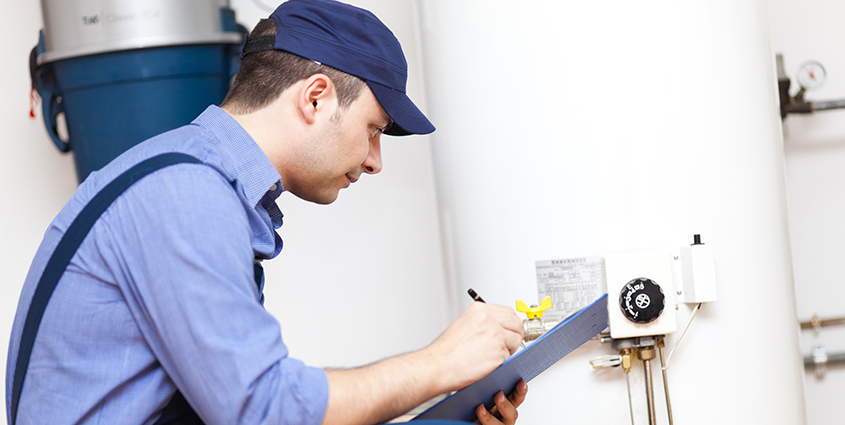Stop what you’re doing
Don't smoke or light a match. Don't open the windows. Don’t use anything that could cause a spark, like a phone, light switch, appliance or flashlight. Don’t start your car or use your garage door to leave.
If you smell gas, think you have a gas leak, have carbon monoxide symptoms or have some other emergency situation, go outside and call 911 and then call us at 1-800-344-4077 (24/7).
Clearing a clogged sewer line may seem to be a simple fix, but it’s important to contact 811 and a professional plumber to ensure the clog is cleared properly and safely.
A call to 811 will help determine if your clogged line could be caused by another utility line crossing through the sewer line – a rare situation called a cross bore. Cross bores can pose a safety risk, if not addressed properly. Contacting 811 won’t guarantee a sewer line is free from cross bores, but it will show you if there are utilities nearby.
Your sewer line's backed up. Time to spring into action and fix it fast. Stop, take a minute to call 811 first. A Columbia Gas representative will mark the gas line on your property in two to three hours in most cases. A plumber can then use a camera to ensure that the line can be safely cleared. But you can't see everything, so if a gas line is marked near the clog, contact Columbia Gas immediately. These simple steps can prevent a serious safety risk to you and your family, even save lives. If you or your plumber tries to clear a blockage using a mechanical snake or root cutter, a gas line could be damaged. This can create a dangerous situation, potentially allowing natural gas to fill the sewer and back up into your home. All across the state, in both old and new neighborhoods, cross bores may have been unknowingly created in sewer lines. Cross bores occur where one underground utility crosses through another. Gas or other utility lines may be in sewer lines outside your home. Be safe. Before you act to mechanically clear a clogged drain, call 811 first. Protect your family, home and neighborhood.
If you are present when sewer lines are being cleared, be alert to any unusual conditions, which may include:
Don't smoke or light a match. Don't open the windows. Don’t use anything that could cause a spark, like a phone, light switch, appliance or flashlight. Don’t start your car or use your garage door to leave.
If you're inside, get out immediately. If you're outside, leave the area quickly.
From a safe location, away from the building, call 911 and our emergency number at 1-800-344-4077 (24/7) and wait for crews to arrive.

Big or small – begin your next home improvement project with a call to 811.

Know our responsibilities and your responsibilities for maintaining natural gas lines.

Don't DIY. Find a qualified professional to help you maintain your natural gas appliances.
Many utilities try to minimize digging in yards, sidewalks and driveways when installing underground pipelines and cables. The technology they use allows for safe and efficient construction in existing neighborhoods and urban areas but can lead to cross bores when a line inadvertently intersects underground facilities.
Thank you for your response.
We’ve created a program to identify and correct cross bores. Along with our contractor, we partner with local municipalities to inspect the sanitary and storm sewer lines and take any necessary action.
Thank you for your response.
Professional plumbers know all the precautions to take when dealing with blocked sewer lines. And they know to always call 811 so utility lines can be marked before work begins. In addition, many plumbers can use a camera to inspect the inside of the sewer line — so they can conclude for certain whether the blockage is a cross bore.
Thank you for your response.

Learn how to keep your home or business safe.
Have an emergency?
If you smell gas, think you have a gas leak, have carbon monoxide symptoms or have some other emergency situation, go outside and call 911 and then call us at 1-800-344-4077 (24/7).